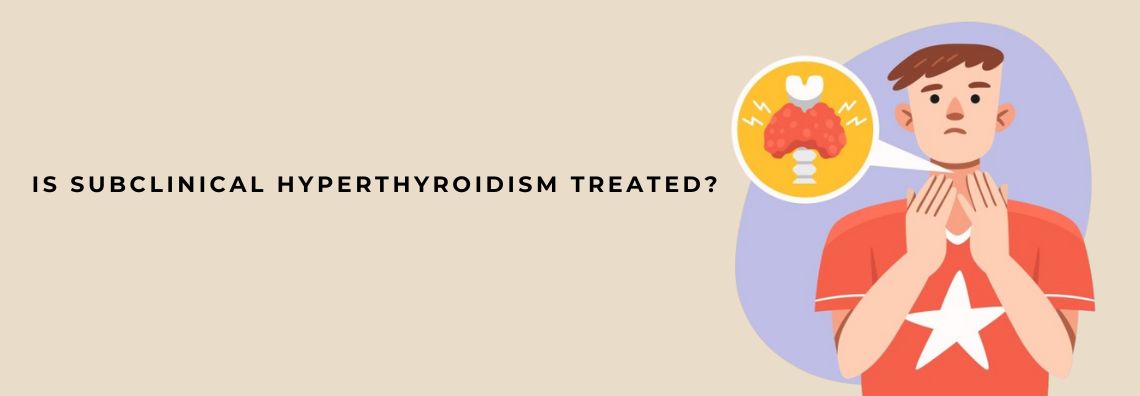
Subclinical hyperthyroidism is a condition where thyroid-stimulating hormone (TSH) levels are low or undetectable. However, thyroxine (T4) and triiodothyronine (T3) levels are normal, meaning the thyroid is overactive but not severe enough to cause noticeable symptoms.
Understand what subclinical hyperthyroidism is and its symptoms. Learn when to consult a thyroid specialist and when treatment is required in this guide. We will discuss the information that you must know, so without further delay, let us get started.
What is Subclinical Hyperthyroidism?
Subclinical hyperthyroidism happens when you have a low or undetectable thyroid-stimulating hormone (TSH) level with normal thyroid hormone levels. It is also known as mild or borderline hyperthyroidism. It is a biochemical diagnosis characterised by a suppressed TSH level while free T4 and T3 levels are normal. Here are some factors that can lead to subclinical hyperthyroidism:
Endogenous (Internal) Factors
Endogenous factors include Graves’ disease, multinodular toxic goitre, toxic adenoma, thyroiditis and autonomous functioning thyroid adenoma.
Graves’ is an autoimmune disorder that causes the thyroid to overproduce thyroid hormones. Multinodular toxic goiter is an enlarged thyroid gland with multiple nodules that produce too much thyroid hormone.
Toxic adenoma is a benign tumor of the thyroid gland that produces excess thyroid hormones. Whereas thyroiditis is an inflammation of the thyroid gland, which can lead to a temporary increase in thyroid hormone levels. Autonomous functioning thyroid adenoma is a single, overactive nodule that produces too much thyroid hormone.
Exogeneous (External) Factors
Excessive thyroid hormone therapy, iodine excess and certain medications can lead to subclinical hyperthyroidism. Consuming excessive amounts of iodine, either through diet or supplements, can lead to subclinical hyperthyroidism. Some medications, including lithium, amiodarone, and interferons, can cause thyroid dysfunction.
Other Factors
Another type of thyroid inflammation that can lead to a temporary increase in thyroid hormone levels is subacute thyroiditis. Areas with lower iodine intake may have a higher commonness of thyroid autonomy.
If you have a family history of thyroid disease, especially Graves’ disease, you can increase the risk of developing subclinical hyperthyroidism. It is more common in older adults, especially postmenopausal women.
Signs Of Subclinical Hyperthyroidism
This condition often doesn’t cause symptoms, but when it does, symptoms can include the following:
- A rapid heartbeat or pounding in the chest, heart palpations.
- A small trembling in the hands and fingers, shakiness.
- Feeling anxious, irritable or hyperactive.
- Having trouble focusing or concentrating.
- Increased sweating or heat tolerance.
- Unexplained weight loss
- Increased hunger
- Changes in the menstrual cycle
- Enlarged thyroid gland, Goiter
- Sleep issues
- Thinning skin
If you have two TSH readings lower than 0.1mU/l at least three months apart, your general healthcare provider may refer you to a specialist.
Treatment Options For Subclinical Hyperthyroidism
Depending on your condition and cause, the treatment options might include observation, antithyroid medications, radioactive iodine, or surgery.
Observation
In individuals with mild or asymptomatic subclinical hyperthyroidism, close monitoring (without immediate treatment) may be enough. The specialist might conduct regular thyroid function tests to assess the progression of the condition.
Antithyroid Medications
These medications include methimazole (tapazole), propylthiouracil, low-dose antithyroid drugs and beta-blockers.
Methimazole (tapazole) and propythiouracil (PTU) can help block the thyroid gland’s ability to produce excess thyroid hormones. Low-dose antityroid drugs are often preferred for Graves’ disease with subclinical hyperthyroidism, as there’s a higher chance of achieving remission.
Beta-blockers medications can help manage symptoms like rapid heart rate and tremors, but they don’t directly address the underlying cause.
Raditoactive Iodine Therapy (RAI)
RAI involves taking a radioactive iodine pill, which is absorbed by the overactive thyroid cells, damaging them and reducing thyroid hormone production. It is often considered the treatment of choice for these conditions: subclinical hyperthyroidism caused by toxic multinodular goiter, toxic adenoma, or Graves’ disease, especially in the elderly.
Surgery (Thyroidectomy)
It involves surgical removal of all or part of the thyroid gland and may be considered when medication or RAI is not suitable or if the thyroid gland is causing significant symptoms (like a large goiter).
Other considerations might include the underlying cause in which the treatment approach depends on the cause of subclinical hyperthyroidism, including Graves’ disease, toxic multinodular goiter and toxic adenoma.
Healthcare professionals will decide the best treatment plan, considering the individual’s specific situation, symptoms and medical history. Regular monitoring of the thyroid hormone is crucial to ensure the treatment is effective and to adjust the treatment plan as needed.
Endocrinologists can often help you with the treatment of sibclinical hyperthyroidism because they are specialists in hormone-related conditions. Are you looking for an endocrinologist in Chermside? Contact your nearby clinic and book an appointment with the specialist.